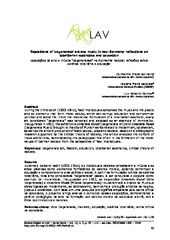| dc.contributor.author | Roitberg, Guilherme Prado | |
| dc.contributor.author | Baptista, Fabiana Maria | |
| dc.contributor.author | Gomes, Luiz Roberto | |
| dc.coverage.spatial | Universidade Federal de Santa Maria (UFSM), Santa Maria - RS | por |
| dc.date.accessioned | 2022-09-29T13:15:49Z | |
| dc.date.available | 2022-09-29T13:15:49Z | |
| dc.date.issued | 2020 | |
| dc.identifier | http://dx.doi.org/10.5902/1983734848141 | por |
| dc.identifier.citation | ROITBERG, Guilherme Prado; BAPTISTA, Fabiana Maria; GOMES, Luiz Roberto. Expositions of “degenerate” art and music in Nazi Germany: reflections on totalitarian aesthetics and education. Revista Digital do Laboratório de Artes Visuais, Universidade Federal de Santa Maria (UFSM), Santa Maria - RS, v. 13, n. 3, p. 97-113, 2020. Disponível em: https://repositorio.ufscar.br/handle/ufscar/16729. | * |
| dc.identifier.issn | 1983-7348 | por |
| dc.identifier.uri | https://repositorio.ufscar.br/handle/ufscar/16729 | |
| dc.description.abstract | During the Third Reich (1933-1945), Nazi intellectuals conceived the music and the plastic arts as elements that form moral values, which can corrupt education and compromise political and social life. From the theoretical formulation of a totalitarian aesthetic, every art considered "degenerate" was censored and exposed as an example of immorality. Inaugurated in 1937, the exhibitions Entartete Kunst (Degenerate Art) and Entartete Musik (Degenerate Music) brought to the city of Munich works related to modernism, Bolshevism, as well as the artistic production of black people, Jews and Soviets. Based on a bibliographic research supported by the Critical Theory of Society, this article analyzes the content of those exhibitions, demonstrating the pedagogical role of art in the formation of the moral values of German society from the perspective of Nazi intellectuals. | eng |
| dc.description.abstract | Durante o Terceiro Reich (1933-1945), os intelectuais nazistas conceberam a música e as artes plásticas como elementos formadores de valores morais, podendo corromper a educação e comprometer a vida política e social. A partir da formulação teórica da estética totalitária, toda arte considerada "degenerada" passou a ser censurada e exposta como exemplo de imoralidade. Inauguradas em 1937, as exposições Entartete Kunst (Arte Degenerada) e Entartete Musik (Música Degenerada) trouxeram até a cidade de Munique obras ligadas ao modernismo, ao bolchevismo, bem como a produção artística de negros, judeus e soviéticos. Com base em uma pesquisa bibliográfica amparada pela teoria crítica da sociedade, o presente artigo analisa o conteúdo dessas exposições, demonstrando a caráter pedagógico da arte na formação dos valores morais da sociedade alemã, sob a ótica dos intelectuais nazistas. | por |
| dc.description.sponsorship | Não recebi financiamento | por |
| dc.format.extent | 97-113 | por |
| dc.language.iso | eng | eng |
| dc.publisher | Universidade Federal de São Carlos | por |
| dc.relation.ispartof | Revista Digital do Laboratório de Artes Visuais | por |
| dc.rights | Attribution-NonCommercial-NoDerivs 3.0 Brazil | * |
| dc.rights.uri | http://creativecommons.org/licenses/by-nc-nd/3.0/br/ | * |
| dc.subject | Arte degenerada | por |
| dc.subject | Nazismo | por |
| dc.subject | Educação | por |
| dc.subject | Estética totalitária | por |
| dc.subject | Teoria Crítica | por |
| dc.subject | Degenerate art | eng |
| dc.subject | Nazism | eng |
| dc.subject | Education | eng |
| dc.subject | Totalitarian aesthetics | eng |
| dc.subject | Critical Theory | eng |
| dc.title | Expositions of “degenerate” art and music in Nazi Germany: reflections on totalitarian aesthetics and education | eng |
| dc.title.alternative | Exposições de arte e música "degeneradas" na Alemanha nazista: reflexões sobre estética totalitária e educação | por |
| dc.type | Artigo | por |
| dc.publisher.initials | UFSCar | por |
| dc.publisher.program | Programa de Pós-Graduação em Educação - PPGE | por |
| dc.subject.cnpq | LINGUISTICA, LETRAS E ARTES::ARTES::FUNDAMENTOS E CRITICA DAS ARTES | por |
| dc.subject.cnpq | CIENCIAS HUMANAS::EDUCACAO | por |
| dc.subject.cnpq | CIENCIAS HUMANAS::FILOSOFIA | por |
| dc.subject.cnpq | CIENCIAS HUMANAS::HISTORIA | por |
| dc.publisher.address | Câmpus São Carlos | por |
| dc.contributor.authorlattes | http://lattes.cnpq.br/3993968379492241 | por |
| dc.identifier.url | https://periodicos.ufsm.br/revislav/article/view/48141 | por |
| dc.publisher.department | Centro de Educação e Ciências Humanas - CECH | por |
| dc.citation.volume | 13 | por |
| dc.citation.issue | 3 | por |

